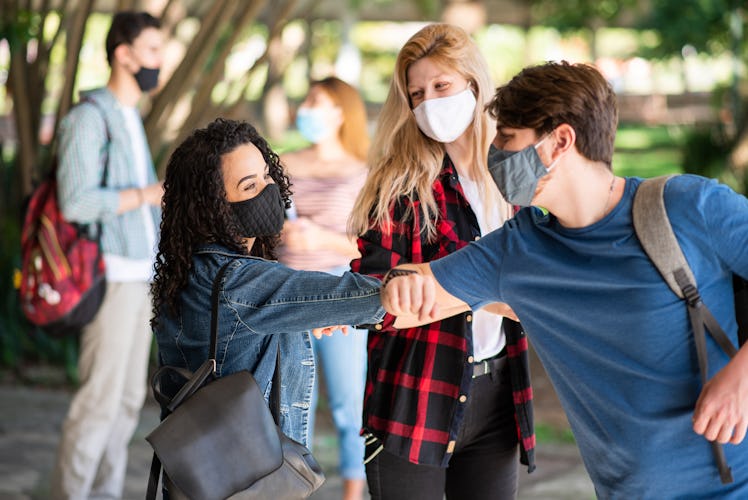
The New CDC Guidance On Vaccines & Socializing Is A Ray Of Hope
As COVID-19 vaccinations become increasingly available across the country, the Centers for Disease Control and Prevention (CDC) is rolling out some new health and safety guidelines for those who have been fully vaccinated. Although the ongoing pandemic remains a very serious threat, experts say there's a light at the end of the tunnel. The updated CDC guidance on vaccines and social gatherings is a ray of hope, and honestly, I've never been more excited to get poked in the arm with a needle.
Let's face it: America has been through a lot since public health authorities declared COVID-19 a global pandemic in March 2020. Schools have been closed, workplaces have moved remote, and many people haven't been able to see their families or socialize in person in nearly a year. That's why the CDC's new guidelines for social gathering after vaccinations, announced on March 8, 2021 are so exciting. While the guidelines still come with several caveats and warnings, they allow fully vaccinated people to take more liberties with social gatherings than unvaccinated people.
According to the CDC, fully vaccinated people don't have to undergo quarantine and testing if they've potentially been exposed the the virus, and (perhaps most notably) can visit low-risk unvaccinated people from a single household or other fully vaccinated people indoors without wearing masks or taking social distancing precautions. However, they warn that social gathering with unvaccinated people should be limited to one additional household, meaning that big parties should stay off-limits for the moment.
To avoid confusion, the CDC points out that people are only considered fully vaccinated two or more weeks after they've received the final dose of the vaccine. So, you'll have to wait at least two weeks after getting a single-dose vaccine, or two weeks after getting the second dose of a two-dose treatment, to catch up on any socializing. And even then, the CDC recommends limiting gatherings among vaccinated people to small, private settings, "while being mindful of the potential risk of transmitting the virus to others." Because experts still don't fully understand how vaccinated people can still inadvertently transmit the virus, experts still strongly recommend that everyone continue to wear masks and social distance in public spaces.
As of March 8, over 525,000 people in America have died from COVID-19, according to The New York Times. Despite these tragic numbers, things are beginning to look up. According to a March 7 report from the CDC, about 30.7 million people have been fully vaccinated with the COVID-19 treatment. While this may seem like a lot of people, it really only amounts to just 9.2% of the U.S. population — meaning the United States has a long way to go when it comes to effective vaccine distribution. According to White House Chief Medical Advisor Dr. Anthony Fauci, it could take several months for the majority of Americans to be vaccinated.
"There’s a difference between [vaccines being] available and when are you going to get them into the arms of everybody," Fauci said in a Feb. 18 interview with Pod Save America. He notes that administering vaccines will most likely take "'til the end of summer" 2021. So while the idea of partying through this summer may be nice, you may be more likely to spend the sunny season feeling vaccine FOMO. Just, do it safely.
If you think you’re showing symptoms of coronavirus, which include fever, shortness of breath, and cough, call your doctor before going to get tested. If you’re anxious about the virus’s spread in your community, visit the CDC for up-to-date information and resources, or seek out mental health support. You can find all Elite Daily's coverage of coronavirus here.